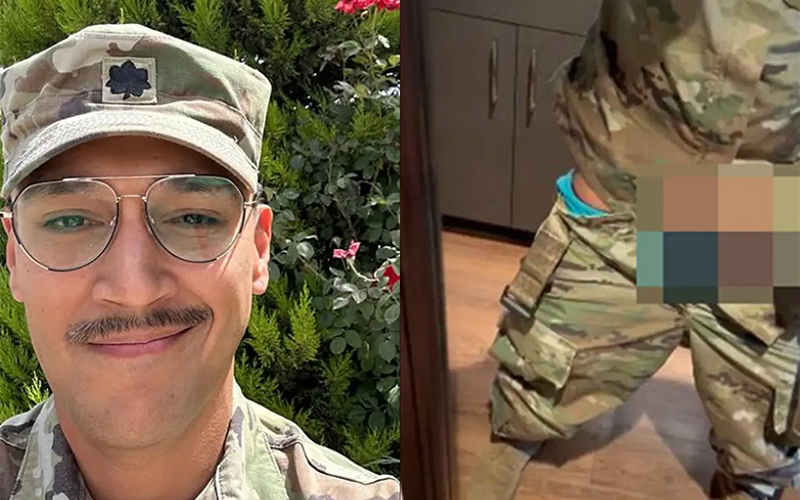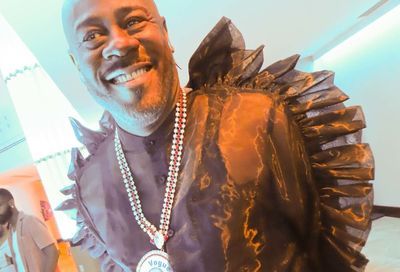Sgt. Nick Harrison is fighting back against Trump’s outdated HIV military policy
The Trump administration's outdated "Deploy or Get Out" policy puts hundreds of HIV-positive servicemembers at risk of being discharged. Sgt. Nick Harrison refuses to go down without a fight.

Since childhood, Sgt. Nick Harrison seemed destined to be in the Judge Advocate General’s Corps, a branch of the military dedicated to military law and justice. Growing up in Del City, Okla., the 41-year-old attorney and independent defense consultant possessed many of the traits that make good lawyers: a strong interest in public service, a spirit of perseverance, and a sharp, inquisitive mind.
“Back in elementary school, I was always the one who was really interested in government and social studies and wanted to know all about the Founding Fathers,” he says. “The teacher would ask a question, and I’d be the kid that would hop up out of his chair, run back, grab an encyclopedia, open it up, and go to the section of the Constitution to try to figure out what the answer to the question was.”
His life took a more determined step towards entering the JAG Corps when, midway through college at the University of Central Oklahoma, Harrison decided to enlist in the military.
“I kind of got to a place where I didn’t think I was making enough progress forward in my degree, so I decided to take a break,” he says. “And thinking about it, the most productive use of my time — or the most honorable way to do it — would be to go and do something in the military.”
For three years, Harrison was stationed at Fort Richardson outside Anchorage, Alaska, where he was an airborne infantryman. Afterwards, he announced his intention to commission as an officer, and was sent back to school to finish his degree. Over the next decade, as a member of the Oklahoma National Guard, Harrison served two tours of duty — one in Afghanistan, one in Kuwait — separated by a stint in law and graduate school, where he earned both his Juris Doctor and an MBA. In short, he was on track to realize his dream of becoming a JAG officer.
That dream came to a crashing halt shortly after his second deployment. Harrison, who came out at 28 and survived the military’s “Don’t Ask, Don’t Tell” era, had come down with flu-like symptoms. He went to a clinic for treatment, where the clinician, puzzled at the symptoms, likened them to something she would see in a person who was HIV-positive. A few weeks later, with some additional bloodwork, Harrison was officially diagnosed with the virus.
That diagnosis — and his subsequent antiretroviral therapy — meant that Harrison quickly ran afoul of the military’s policy regarding HIV-positive soldiers. Crafted at the height of the AIDS epidemic in the late 1980s, it dictates that any soldier with HIV is considered undeployable, and cannot be sent to military posts outside the country for more than 12 consecutive months. The policy also prevents enlisted members from applying to become officers, and recommends eventual separation from the military.
Despite obtaining supporting documentation and testimony from his doctors that he would be able to meet all the necessary requirements to become a JAG officer, Harrison’s request for a medical waiver was rejected. His hopes of becoming an officer met an abrupt end.
“That really frustrated me, because I’d been told that it was a perfectly reasonable request,” he says. “The medical professionals were all on the same page, the legal professionals were all on the same page, and for some reason, they were stuck in the process of ‘We don’t give waivers, we don’t give exceptions for people with HIV.'”
Enlisting the help of Lambda Legal, Harrison, now a member of the D.C. National Guard, began mounting a lawsuit against the Department of Defense for a policy that he says disregards the most up-to-date scientific information on HIV. They also claim that it violates his Fifth Amendment rights to due process and equal protection under the law, and discriminates against HIV-positive people in a way that triggers heightened scrutiny.
Since filing the lawsuit in May, Harrison’s lawyers have asked a federal judge for an injunction to stop the Pentagon from forcibly discharging Harrison or other service members living with HIV while the case is being litigated.
For Harrison, the Department of Defense’s policy on HIV-positive individuals hearkens back to a time when individuals were judged solely by their membership in a group, not on their ability to do a job.
“The military philosophically has this ingrained ‘One Team, One Army’ approach, where even though people may have personal opinions or prejudices or issues coming from different backgrounds, and they may not share the same perspective on things, the Army as a whole says that we don’t really care about differences,” Harrison says. “We don’t care about race, gender, ethnicity, socioeconomic background, religion. You can have all these things as long as it doesn’t detract from the mission.
“One of the reasons I have such a problem with the HIV policy is that this medical condition is one of those differences that the Army says we don’t care about. Diversity makes us stronger. If it doesn’t affect the mission, it shouldn’t impact anything.”

METRO WEEKLY: What was your coming out experience like?
NICK HARRISON: I came out late in life, after I was 28. I actually was married to a woman for a little bit. We were together two or three years before I came to accept my identity.
I never really had the formal conversation with the parents, or with anyone else, saying “I’m gay.” My younger brother is actually gay, too, and he decided that before me, and so he came out to our parents and did that whole thing. But it took me a while to come to understand that about myself.
I guess I should’ve always known that I was gay. Looking back on instances in high school and college, I’d see somebody that I thought was attractive. A lot of times I would self-rationalize it as hero worship, rather than sexual attraction. I went through the phase where I was in denial for a long time. Close to the end of receiving my bachelor’s degree, I started exploring, and then I went through a period where I identified as bi, and eventually, I’ve come to accept that I’m primarily gay.
Coming from Oklahoma, there’s a lot of social stigma. In the military, when I first started exploring, first started coming to accept that part of my identity, we were under the “Don’t Ask Don’t Tell” policy as well. So there was a period in which I was closeted and bisexual. While I was deployed overseas and in the military, the OutServe-SLDN organization was helpful to me, and I began meeting other soldiers through that.
MW: Did you ever fear being outed?
HARRISON: During the early part of “Don’t Ask Don’t Tell,” I did. It was a time in which I didn’t want to show affection in public. If I was out on a date or something, I was always concerned about “Well, is there anybody around here that’s also in the National Guard?” So that was always something that was a concern for me.
On my second deployment, in 2011-2012, under President Obama, the pendulum shifted. It was much easier to be gay in the military even though “Don’t Ask, Don’t Tell” was still in place, because Obama had raised the bar, so it was very difficult to throw anyone out because they were gay. I think it required a three-star general, a bunch of evidence and stuff, and the handwriting was already on the wall that the president intended to get rid of that policy. He wanted to change it, and so that was a very freeing, liberating experience.
MW: What impact has the military had on your life?
HARRISON: It really helped me grow up. When I took a break from school because I ran out of financial aid, the military was the place I went to resolve that, to think about who I wanted to be and what I wanted to become. That’s where the most formative stages of my life were: in the military. It was an opportunity for me to experience new things, become a more well-rounded person, do some stuff that I missed out on, and learn how to become part of a bigger team. That was really important and very fulfilling for me.
MW: What motivated your decision to pursue law and apply for the JAG Corps?
HARRISON: Serving in the military, both on active duty and the National Guard. There are a lot of good officers that you serve under, and there are a lot of bad officers that you serve under. To a non-commissioned officer, to a sergeant, to somebody who has served as enlisted, one of the driving forces for becoming an officer is, “Oh, this will let me take care of the men better than some of the officers that I’ve served under.” I came to a decision that I could take that role, and I could take care of the people who were in my unit and the people in the platoon who were assigned to me.
JAG officers are the people who take care of everybody else if their first line officer doesn’t take care of them. If a soldier gets into trouble or his officers have failed him, his leaders haven’t trained him properly or whatever, they usually end up in some sort of a UCMJ process, a legal process in the military, and the only people who can really do anything about that, and look out for a soldier’s interest, are the JAG officers.
MW: Let’s talk about your serostatus. When did you learn that you were HIV-positive?
HARRISON: It was shortly after my second deployment in 2012, back in Oklahoma. I thought I had a cold or a flu, so I went into a clinic. They put me on antibiotics initially. That didn’t seem to help, so a week later, I came back. The clinician said “Some of these symptoms look like something that I would see with someone who was HIV-positive.” That triggered me to go in and get another blood test, and that’s when they confirmed that I was HIV-positive.
MW: How did you react to the diagnosis?
HARRISON: I probably took it better than most people would, because in law school I dated a guy who was HIV-positive and undetectable for a year, year and a half, and so I had been up close, around it, and seen that it isn’t this huge devastating thing. Because I had dated and been intimate with somebody who was HIV-positive, I understood what it meant to have the virus, and what the treatment was.
It was a little tough getting into the system initially, because I was coming off active duty going into the VA medical system. After I got the test results, I remember going to Tinker Air Force Base, because that’s where I was receiving my medical treatment. I ended up asking to see the patient advocate who took me back to a room. I told him I’d just been diagnosed with HIV, and I needed to start that process of treatment. They put me on Atripla, a pill-a-day regimen. I became undetectable fairly quickly after that. After I sought treatment, Tinker Air Force Base notified up the chain of command to Washington, D.C. and the Department of the Army. Then they reached back to the Oklahoma National Guard and down the chain of command to my unit.
The brigade’s Medical Readiness Officer was very nice. She reached out to me, and her initial concern was whether I was all right, because most people are devastated by the news. She talked to the chain of command, and told me about who needed to be notified. Then she moved to me to the office of Joint Force headquarters, where I currently serve because I’m not considered deployable.
MW: Besides having an outdated understanding of HIV, why do you think the military classifies people with HIV as non-deployable, since the condition is now treatable with a daily medication?
HARRISON: At the time the policy was written, back in the ’80s or ’90s, it made a lot of sense and it was actually a very compassionate policy. That was before they really had effective treatments. You weren’t expected to live that long, and so the military was doing a very compassionate act at the time, saying, “Okay, we’re gonna identify these people. We’re gonna make sure they get the best medical treatment that’s available.” The scientific understanding of HIV has changed dramatically, but they haven’t rewritten the policy.
The interesting thing is that some branches of the military are rewriting the policy. If you look at the Navy or the Marine Corps, they’ve changed their policy. In others, like the Army and the Air Force, you have bureaucratic inertia, and the people in positions of power aren’t rewriting the policy like they should be.
MW: Why is there resistance?
HARRISON: I think it’s twofold. One is just bureaucratic inertia. The other is a lack of understanding. If you actually talk to the medical professionals and the legal professionals who are in the military right now, they’re all on board. The Army does some of the most cutting-edge HIV research. They write articles. They put things in publications. They give lectures on it. They go to these HIV sessions where everybody gets together. They’re always presenting. The problem is that you have people who don’t have that medical or legal expertise, or that understanding of HIV, who are involved in writing the policy.
MW: Is there still ignorance around how HIV is transmitted or treated in the military?
HARRISON: There’s always going to be an education or training component whenever you implement any policy. The military has done that repeatedly. Anytime they made a change, they had to go out there and explain: “This is the policy change that we’re making. This is why we’re changing it. This is how you should look at people who are coming into the military who fit into that category.” I think the military is very adaptable. We’re a very mission-oriented organization. I think we can deal with that. It’s just the leadership or the headquarters has to expend the effort to do it, to do the training and the education, as part of the change in the overall policy.
MW: Is there a cost concern for the military, given that HIV medications can carry a large price tag?
HARRISON: I don’t think cost is really a legitimate issue. They have HIV-positive service members now. They’re just not fully utilizing them. They’re not deploying them, they’re not allowing them to be advanced and to be promoted, and so they already have that expense as well, but I mean that’s an expense that is everywhere else too. It’s in the federal government. It’s in the civilian sector.

MW: Why did you decide to move forward with a lawsuit?
HARRISON: I was graduating law school, and I’d been offered a commission in the National Guard or the Reserves. I wasn’t able to pursue that at that time, because I was being deployed and couldn’t take the bar exam. When I came back, I did an interview with the D.C. National Guard, and was offered a position in the Legal Services Office supporting the Director of the National Guard Bureau. So I decided to start the process and go through asking whether I could get an exception to the policy or a waiver.
I sent letters out to several different people. One of them ended up bouncing around to the headquarters at the Pentagon. A lieutenant colonel, who was the medical resilience officer at the time, reached out to me and said, “We got your memorandum. This is exactly what you need to submit to get an exception to policy, but you don’t have any of the supporting materials.” She really helped me build the packet asking for an exception. She also said that what I was asking for was a perfectly reasonable request.
So I assembled the packet. I got all the supporting documents together. They wanted medical records, history, and service records, and all that different stuff. The packet went in front of a medical person up there who said, “There’s no reason he shouldn’t be an officer. He’s fully capable of all of his duties.” Then the medical resilience officer put the request in front of the Deputy Chief of Staff of the Army. He said, “Okay, this looks good. This is what I need to consider this.” But he has to go through the chain of command. He has to get their endorsement, so they kicked it all the way back down to the beginning, and they said, “Go to each leader through the level of your organization and get them to sign off that says, yes, I’ve seen this, I concur, or I don’t concur.”
MW: How did you hear you had been rejected for a waiver?
HARRISON: I was originally offered the commission back in November of 2013. But then I didn’t hear back until July 2015, and they sent me a form letter saying no. “We’ve looked at the packet that you put together, and we’ve determined that it is not in the best interest of the Army.” That’s all it was: a one-paragraph answer.
The D.C. National Guard had assigned a JAG attorney, Capt. Cravins, to help me through the process. He was working at the National Urban League as his civilian job. He introduced me to people at the Human Rights Campaign and said, “Maybe you should talk to these people.” They set up a bigger meeting with a bunch of HIV advocacy groups, one of which was Lambda Legal. They said that this policy was something that they’d been trying to change for a while, that they’d gotten some language included in the NDAA [National Defense Authorization Act] back a few years, but hadn’t seen any movement forward since then, so they were very interested in the case. Lambda Legal, in particular, thought that my case and the circumstances surrounding my situation were the ideal test case to challenge the policy.
I also did a little advocacy on my own. I went to Capitol Hill, met with the legislative aides on the House Armed Services Committee and the Senate Armed Services Committee, going to each and every office that would let me in the door and have a meeting, sitting down with them, showing them my packet, showing them the current HIV policies.
Surprisingly, it was extremely well-received on both sides of the aisle up there. The Democrats see it as a social justice issue. They view it from a rights perspective. Republicans see it from a readiness perspective. They’re like, “We have all these people in the military, they’re perfectly able to do the duties, but for some reason, the military isn’t letting them deploy, isn’t letting them move up.”
MW: The Pentagon has now introduced a “Deploy or Get Out” policy, which has primarily been used to argue for the expulsion of the transgender community and other groups that are considered “non-deployable.” Was the announcement of the policy the impetus to move forward with the lawsuit?
HARRISON: We were always planning on bringing the lawsuit. I think when “Deploy or Get Out” came out, there was a greater sense of urgency. It was seen as a target of opportunity, something else that needs to be fixed, that needs to be added to the lawsuit because fundamentally, the problem is the HIV policy. People who are HIV-positive shouldn’t have deployment limitations. They shouldn’t have these bars that limit their advancement, or compromise their ability to continue to serve. Fundamentally, it’s a problem with the HIV policy itself. The “Deploy or Get Out” policy is kind of a complication because they want to kick everybody out who’s non-deployable, and at the same time, you have people in the Army that are not expending any effort to rewrite the HIV policy as they should.
MW: How is it affecting day-to-day life in the military?
HARRISON: I think everybody in the military right now is in a state of limbo because of the “Deploy or Get Out” policy. All of us are very concerned about what that means because the HIV policy hasn’t been rewritten and because we’re waiting to see how that broad statement that’s been put out there is implemented by the services. It’s possible at some point that the military might just try to kick all of us out. There are about 1800 of us in the military right now with this condition.
It continues to put me in a certain level of uncertainty. I know where I can put my skills to best use in the military, serve on JAG office, but I’m precluded from doing that. So I’m basically in limbo as far as what I can do, and just sitting in a Joint Force Headquarters slot waiting until this is resolved.
MW: Besides a revision of the policy, what else are you asking for?
HARRISON: We’re focused on the deployment restrictions and on the ability to commission. I think, more broadly, the military does need to consider what the medical professionals tell them about how the policy needs to be updated and implemented in order to be effective.
MW: How often is a JAG officer required to deploy?
HARRISON: It really depends on the position. There are people who do deploy overseas, but the interesting thing is that they’ll deploy overseas, and then they’ll work right alongside civilian attorneys, government attorneys, or contractors, each of whom don’t have HIV restrictions.
MW: To that end, some people are going to say why should we challenge this policy? Why can’t you apply as a civilian lawyer?
HARRISON: I think it’s a question of fairness and the inconsistency of the HIV policy. Across the federal government, agencies have taken a look at the situation. You can be HIV-positive and serve in law enforcement, you can serve in the foreign services, healthcare, food service. There are not restrictions in any of these other industries. So if we’re saying discrimination is not allowed in any of those places, then why are we allowing discrimination to continue in the military, particularly with the philosophy that the military is supposed to be “One Army, One Team”?
MW: Do you worry that some people might wrongly use your sexual orientation and HIV status to argue that we shouldn’t have openly gay soldiers?
HARRISON: I haven’t really been concerned about it. I don’t think HIV is an exclusively gay issue. I think it applies to everyone.
MW: Who do you rely on for support?
HARRISON: I’ve got a very good team around me, in terms of the coalition that’s been built. My legal team, communications team. There’s a congressional team as well. I have a boyfriend, Brock. We live together in Columbia Heights. He’s been incredibly supportive. Whenever you undertake something like this lawsuit, it’s not just you that is undertaking it.
Most of the other support I have is from coworkers. One of my bosses is a really good friend of mine and is well aware of the situation. People in the National Guard have been supportive as well, as have the people in Stonewall Kickball, and at The DC Center, where I’m a member of the board of directors.
MW: How much stigma is there about HIV in the LGBTQ community?
HARRISON: There is still a lot of HIV stigma in the community. It’s something that is gradually being addressed through education and training as well. The Undetectable = Untransmittable campaign is important and a vital part of that. I think that that’s really made a very big impact in the community. So far, the reception I’ve gotten with this case and coming out because of it has been positive. At the same time, I haven’t read the comments on all the articles. I’ve purposefully avoided them because I know that that’s where I would see negative comments.
MW: Have you gotten any nasty emails or direct mail?
HARRISON: Nothing yet. Everybody who’s approached me so far has been positive. I’ve had people that I haven’t been in contact with for a while reach out to say they’ve read the story and express their support.
MW: When we talk more broadly about being HIV-positive, what still needs to be done to combat stigma?
HARRISON: I think it’s mainly a process of getting people to understand that people who are HIV-positive and are on effective treatment become undetectable, it really doesn’t affect their day-to-day lives. They can’t transmit the virus. There are really no harmful side effects with the drugs these days. It’s really a pill-a-day regimen. They can still have long lifespans. They can still have meaningful relationships without putting anyone at risk. They’re just normal human beings. I think it’s very important for people to understand that.
For more information on Sgt. Harrison’s case and others like it, visit lambdalegal.org.
Support Metro Weekly’s Journalism
These are challenging times for news organizations. And yet it’s crucial we stay active and provide vital resources and information to both our local readers and the world. So won’t you please take a moment and consider supporting Metro Weekly with a membership? For as little as $5 a month, you can help ensure Metro Weekly magazine and MetroWeekly.com remain free, viable resources as we provide the best, most diverse, culturally-resonant LGBTQ coverage in both the D.C. region and around the world. Memberships come with exclusive perks and discounts, your own personal digital delivery of each week’s magazine (and an archive), access to our Member's Lounge when it launches this fall, and exclusive members-only items like Metro Weekly Membership Mugs and Tote Bags! Check out all our membership levels here and please join us today!
























You must be logged in to post a comment.